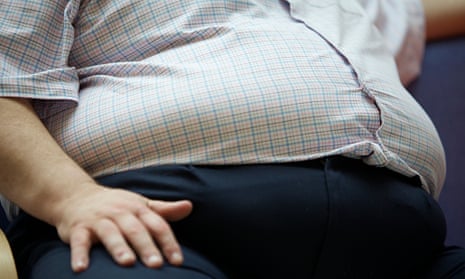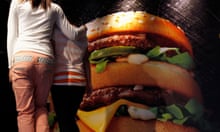A new study from University College London found that weight discrimination accounts for about 40% of the harmful psychological effects associated with obesity. Lead author of the study, Dr Sarah Jackson, thinks that the UK should have legislation to protect people against “fat shaming”, similar to our legislation on race and sex. Otherwise, we run the risk of sending out the message that it’s socially acceptable to behave in this way.
I would also ask: isn’t it time there was widespread public recognition of certain types and degrees of obesity as food disorders, which have the potential to be as complex, out of control and pernicious as anorexia? In fact, one would hope that experts in food disorders, who are dealing with everything from anorexia to binge-eating, would find this an odd question and an old one. With any unhealthy relationship with food, there are always psychological issues.
However, in terms of public acceptance of obesity as a food disorder, that might be slow to catch on. Too many people don’t want to acknowledge that, at the extremes of obesity, sufferers could be ill and helpless. These are usually the same naysayers who trumpet: “Eat less, move more,” who wave individual responsibility like a big stick with which to beat the obese.
Of course, individual responsibility works – but only for some people, and only sometimes. This is not even taking into account the fact that food itself has changed, rendering those susceptible to unwanted weight gain, or food addiction, even more at risk And, while in terms of discrimination, some might say, you can’t change your race or sex, but you can control your weight, isn’t this rather simplistic?
There seems to be a world of difference between moderately overweight couch potatoes, who would sportingly accept their own culpability, as most do, and a morbidly obese person who dramatically over-consumes food, gorging on it, craving it, as though it were a drug. Watching the latter group eat, it’s as though they are hypnotised, in a state of psychological and emotional paralysis, not entirely in control of their actions. How could “eat less, move more” and cries of individual responsibility hope to penetrate this dense, toxic, self-loathing fog?
Yet still the myth persists that being overweight is always people’s own fault. They allowed themselves to get into that state, they need to snap out of it; no exceptions, one diagnosis fits all. Would anyone dare to direct such off-the-peg attitudes to an anorexic? “Being dangerously underweight is your own fault. You allowed yourself to get into this state. Snap out of it.” Not these days.
Yet before anorexia was properly understood, “just make them eat” was a catch-all analysis. Anorexics were judged to be neurotics and attention-seekers, a bunch of spoiled, over-indulged, exclusively teenage girls. Now obese people are treated just as roughly and unkindly, the only difference being that the clueless, unhelpful, potentially deadly advice has gone from “eat more” to “eat less”.
Is this where the crude line of obesity as the new anorexia might make sense – in terms of the length of time it might take for sufferers to be taken seriously? If certain types of obesity were publicly accepted as the consequence of food disorders, the issue of personal responsibility would become void. An obese person’s lack of control around food would be deemed equivalent to an anorexic’s need for control around food. Obese people would not inspire mirth, contempt or shaming, any more than a dangerously emaciated anorexic person would.
As with anorexia, it’s all just a matter of banishing hard-wired prejudices and adjusting perception. If the public can accept the existence of a food disorder at one end of the spectrum, why not the other? Anorexia took some time to be taken seriously – how long will the obese have to wait?
Give the 1D fans a break. You’re only 13 once, after all

There have been quite wonderful amounts of snark concerning Zayn Malik’s departure from One Direction. Of course One Direction fans are emotionally unstable and melodramatic – they are teenagers. It’s their vocation to be emotionally unstable and melodramatic. If you can’t fall wailing to the floor, threatening to do yourself an injury with a scented gel pen when you’re 13, when can you?
At least these fans are young, and can’t be expected to know any better. Older music fans aren’t above such behaviour. Look at how the hippies went into meltdown when Bob Dylan “went electric”.
More recently, there was an unsavoury outburst when Kanye West was announced to be headlining at Glastonbury.
The way some Glastonbury festival-goers react to black headline artists is creepy (I mean musically narrow- minded, not racist… or maybe that is what I mean). However, this was the worst ever. Anguished whingeing, sprawling petitions, and enough pathetic moody tantrums to make 1D fans look like the very souls of restraint.
It’s not only the very young who can be immature comical brats when the music doesn’t go their way.
In love with Downton for far too long

Downton Abbey is coming to an end. Hallelujah! One less time-wasting chunk of “commitment TV” to worry about. Everyone talks about commitment TV as if it’s a good thing, but what about the dark side? What about when you over-commit, to the point where you can’t let go? When you become a viewer who, to borrow from self-help parlance, loves too much? Or, more specifically, watches for too long?
I serially over-commit, grimly hanging on to shows, long after the initial sheen has faded.
Lost is the gold standard for the perils of TV over-commitment. When I’m gasping my last on my deathbed, sucking hard for that final sweet breath, I will regret persevering with that steaming pile of bewildering eye-poo. Vampire series True Blood was another time-waster – I only gave up when the fairy ring codswallop started up (don’t ask).
I’m still faithful to Hannibal, but there are only so many times you can watch someone cook a nice brunch with human entrails before it gets a tad repetitive.
Basically, I’m an easily led mental weakling who’s a slave to the series link button. If something has a green arrow next to it, and is duly recorded, I do as I’m told and watch it – most probably with a terrible vacant expression on my face, and a line of drool hanging from my bottom lip.
So it has been with Downton Abbey, where there have been far too many interminably tedious episodes concerning what food to serve at the local fete, and how to maximise farming revenue.
Boring! Yet still I watch. So thank God they’re doing the decent thing and axing it. Everyone has programmes where they hang on for longer than is strictly good for them. We need permission to let go.








